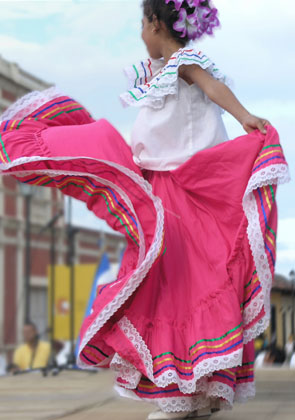Establishing Credibility
A policeman Carlos came into our office asking Pablo to decipher the address of someone he needed to investigate. We all had a few laughs and a cup of coffee trying to figure out who and where he was looking for. We played with his handcuffs and nightstick. It’s hard to imagine this scenario in the USA
Police in San Ramon are friends and neighbors and clearly not looking for conflict. They don’t keep their hands on their pistols or look over their shoulders. They can be seen in the park, shaking hands, riding their bicycles and hanging out
In a relationship-oriented culture such as Costa Rica's, you need to establish genuine rapport with people, even if you have a proper background and credentials like an advanced degree. Let relationships develop through friendly interaction and informal social gatherings. Learn to trust and gain your Costa Rican colleague's trust — you are embarking on a friendship
Try to learn a little of Costa Rican history and culture, or to interact with local people. This will communicate sincere interest in people and country, and will allow you to participate more fully in conversations
In order to build relationships thought conversation, be sure to use good eye contact when conversing and avoid using sarcasm, which may be misinterpreted. Also avoid being seen as condescending
Conversation Topics
Appropriate Conversation Topics

- To make a good first impression, it is good to compliment Costa Rica's beauty, especially that of the nature reserves
- Polite questions about people's children and families
- Advice about what to do and see in Costa Rica or the city you're visiting
- Costa Rica's beautiful landscapes
- Weather and climate: check weather
- Sports, especially soccer: check soccer Costa Rica
- Politics and current events are especially appropriate topics, especially for foreigners, as Costa Ricans are proud of their democratic government and many years of peace
Inappropriate Conversation Topics
- Negative comments about Costa Rica
- Asking a woman about her job unless you know for sure that she works outside her home – many women don't
- Asking overly personal questions about a Tico's (Costa Ricans) profession or family life
- Be sure to learn the proper ways to greet and address people
People value democracy and consensus yet feel comfortable with strong leadership provided the leader listens to others and take them seriously. A manager who is people-oriented, friendly, humble and respectful of the culture and individuals will be very effective in Costa Rica. It is also vital to be seen as fair and be able to manage conflicts without causing anyone to lose face
Obtaining Information

Locals are unlikely to share sensitive information with you unless they already know and trust you based on a relationship you have built previously over time. You may approach such a colleague on a one-to-one basis, preferably in an informal setting. Bring up the topic but be sure to keep the conversation confidential
On topics that are not overly sensitive, there are a number of useful strategies you can use to draw out your Costa Rican colleagues:
- Involve an intermediary. This can be someone else in the organization or an outside consultant who is respected by the organization
- Ask questions and listen carefully to the answers. Even if your colleague is not speaking completely openly, it is possible that a deeper message may be discernible in the answer you receive
- Create an environment in which our audience feels safe sharing their ideas by gradually building one-on-one relationships with them. Do not rush to discuss issues, but spend time learning about their backgrounds and sharing your own. Communicate your interest in hearing their ideas and the value you hold for their input, and discuss the importance of their input to the business
- Build towards the goal of having everybody share ideas in group meetings. Do not immediately criticize ideas that are proposed, especially in front of the group
Persuading People and Presenting Ideas
Be sure to have concrete data, show results, and communicate clearly when you are making a point and need to persuade others. Local culture value the democratic process, respect for the individual and the practice of consensus-building
When you are leading a team, first share what you would like the team to accomplish, allow ample time for all team members to give their thoughts, and then reach a conclusion that shows you've listened to their thoughts, even if the direction you've chosen is different than what they may have desired
Costa Ricans react well to visual presentations that are well designed, backed by facts and to the point. Charts and other visual aids are very useful. English comprehension is high, but try to avoid English idioms and metaphors that may be unclear or unfamiliar to a non-native English speaking audience
Take time during your presentation to ask for input and feedback. You may not get any, but allow adequate time for the audience to speak. When you do receive input, acknowledge the contributor and consider the contribution carefully before discarding it or moving on. People appreciate good listeners and rational thinkers. Demonstrating that you are listening can earn you valuable points
It will always be to your advantage to meet with key individuals prior to making a general presentation in order to get their thoughts as well as their buy-in and, hopefully, their active support of your ideas
Effective Leadership Styles

Costa Ricans value the democratic process yet generally feel comfortable with a strong leader provided the leader listens to others and takes them seriously. A leader who is people-oriented, friendly, humble and respectful of the culture and individuals will be very effective
Keep communication open and clear, and make sure your objectives and expectations are also clear. Be respectful of others' opinions – listen to them without interrupting and, if you are the final decision-maker, come up with solutions that incorporate their input. It is also vital to be seen as fair and be able to manage conflicts without causing anyone to lose face
Costa Ricans want to be respected as individuals, but they also have a strong appreciation for the consensus-building process. They also generally respond well to public recognition and positive feedback, both privately and in front of their peers. Be clear about roles and responsibilities, but also allow for possible unexpected limitations
Costa Ricans tend to be highly educated and very proud of their educational system. Do not unintentionally act in a condescending manner to them by micromanaging their work. Costa Ricans are eager to learn new skills and grow, but also need to be able to adapt new information and ideas to the styles and strategies that work for them
Teams generally work well in Costa Rica, especially if the members already have relationships with each other, but teams may also require a little more direction than in other western countries. This can often be aided by the appointment of a team leader whom the team knows and respects
An effective leader is also expected to provide guidance to his/her employees in a mentor-like manner and to ''look after them'' almost as a parent would a child. This concern is often offered in exchange for the respect a manager receives from his/her subordinates
Giving and Receiving Feedback
Costa Ricans typically have a certain sense of personal pride and dignity and they highly value social harmony; therefore they are often not very comfortable giving or receiving feedback on job performance. If you are the one giving the feedback, having established a prior positive relationship will be a definite advantage
It is extremely important to not cause anyone to lose face. Set expectations and standards for how feedback and evaluations will be delivered so everyone is aware and prepared for the process, otherwise your Costa Rican subordinates may, for example, respond in a passive-aggressive manner and end up blaming you for comments that were deemed not sufficiently positive
Giving a Costa Rican public recognition or positive feedback in front of peers is very appropriate and will generally motivate the individual
Resolving Conflict and Making Decisions

A harmony-loving people, Costa Ricans generally do not deal well with conflict. They tend to take disagreements personally, so separating themselves from the issue at hand can be very difficult. Having already established positive relationships is the key to your effectiveness in diffusing conflict involving yourself or others
The best strategy to resolve conflict is to deal with the situation informally on a one-to-one basis or via a third party. Avoid situations that may lead to an individual's losing face, such as dealing with the problem publicly or within sight or earshot of peers. Never yell or express dissatisfaction aggressively. If a Costa Rican displays passive-aggressive tendencies, consult a trusted Costa Rican associate to find out what is going on. Be tactful and subtle, and always do your best to maintain a reputation as someone who is fair
The consultative decision-making style is much more effective in dealing with Costa Ricans than an authoritarian style. Costa Ricans respect a credible leader who cares about them and they value the consensus-building process. Therefore, it is important to share ideas with others, make an effort to get input, and listen carefully to others' ideas, incorporating them in the final decision if possible
Costa Ricans don't necessarily expect to have input into all important business decisions, but many Costa Ricans do place a high value on the democratic process and therefore appreciate being consulted and having relevant information shared with them
Interesting Links



















